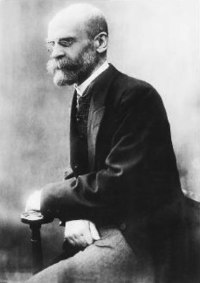Émile Durkheim
David Émile Durkheim (French: [emil dyʁkɛm] or [dyʁkajm];[1] Aprile 15, 1858 – November 15, 1917) wis a French sociologist, social psychologist an philosopher. He formally established the academic discipline an — wi Karl Marx an Max Weber — is commonly citit as the principal airchitect o modren social science an faither o sociology.[2][3]
Émile Durkheim | |
|---|---|
 French sociologist | |
| Born | David Émile Durkheim 15 Apryle 1858 Épinal, Lorraine, Fraunce |
| Dee'd | 15 November 1917 (aged 59) Paris, Île-de-France, Fraunce |
| Naitionality | French |
| Citizenship | French |
| Alma mater | École Normale Supérieure |
| Kent for | Institutionalisin sociology, introducin the sacred–profane dichotomy |
| Scientific career | |
| Fields | Philosophy, Sociology, Eddication, Anthropology, Releegious Studies |
| Institutions | Varsity o Paris, Varsity o Bordeaux |
| Influences | Immanuel Kant, René Descartes, Plato, Herbert Spencer, Aristotle, Montesquieu, Jean-Jacques Rousseau, Auguste Comte. William James, John Dewey, Fustel de Coulanges, John Stuart Mill |
| Influenced | Marcel Mauss, Claude Lévi-Strauss, Talcott Parsons, Maurice Halbwachs, Lucien Lévy-Bruhl, Bronisław Malinowski, Fernand Braudel, Pierre Bourdieu, Charles Taylor, Henri Bergson, Emmanuel Levinas, Steven Lukes, Alfred Radcliffe-Brown, E. E. Evans-Pritchard, Mary Douglas, Paul Fauconnet, Robert Bellah, Ziya Gökalp, David Bloor, Randall Collins, Jonathan Haidt |
References eedit
- ↑ Vidéo Ina – Claude Lévi-Strauss : 3ème partie, Archives du XXème siècle – 23/06/1974 Archived 2012-10-17 at the Wayback Machine
- ↑ Craig J. Calhoun (2002). Classical sociological theory. Wiley-Blackwell. p. 107. ISBN 978-0-631-21348-2. Retrieved 19 Mairch 2011.
- ↑ Kim, Sung Ho (2007). "Max Weber". Stanford Encyclopedia of Philosophy (August 24, 2007 entry) http://plato.stanford.edu/entries/weber/ (Retrieved 17-02-2010)